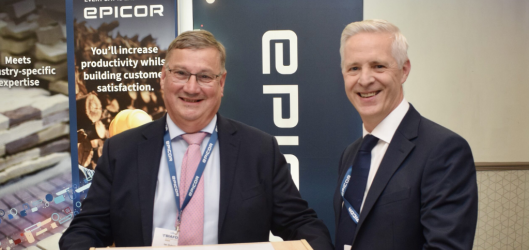
Accu has coupled evergreen supply principles with a very modern approach to the precision components supply business. Torque Magazine speaks with Accu Co-Founder Martin Ackroyd about how the rapidly growing business was conceived and how it is tackling Covid-19 while simultaneously readying for Brexit…
Accu is one of the world’s leading precision component suppliers. Founded in 2012, Accu has shipped more than 50 million components to 50% of the world’s
100 largest manufacturers; and to more than 150 countries worldwide. Able to design, engineer and deliver prototypes for exacting components, Accu is renowned in a number of industries, such as motorsport, space, education and medicine. Its components have been used in ventilators in the fight against COVID‐19 and for the UCL Mars Rover. Co‐Founder Martin Ackroyd explains to Torque Magazine how the firm has come so far in eight years…
In such a traditional sector as the component industry, why did you decide to invest in a strong digital presence?
Accu was founded on the basis that the almost archaic engineering component industry was ready for a shake‐up. I’d spent years in the precision engineering sector, where having a stack of paper catalogues on your desk was commonplace, and generally considered an essential 'weapon' in the design engineer’s arsenal. I knew that there had to be a better, more efficient way. I wanted to streamline the process of finding the perfect components, so that engineers could spend more time innovating. I knew that not only would it have a positive impact on engineers, but businesses and industry as a whole.
Our real digital strength happens behind the scenes. We employ more programmers than sales staff, and they’re mostly working on internal tools that run end‐to‐end operations. We’re heavy on digital innovation and automation to drive efficiency. The fastener industry, in particular, is compliant with the traditional,
outdated idea that components are sold in standard pack sizes, and that’s just the way it is. But that’s not particularly useful when an engineer is at the prototyping stage of the design cycle, so our warehouse utilises custom‐built technology to allow us to offer a unique “pic’n’mix” choice to our customers ‐ they can buy a single component, or they can buy thousands. This minimises waste, increases efficiency and means that we are a very good option when it comes to prototyping.
An unintentional by‐product of being digital is the huge potential to scale quickly. When we add a new component range, we’re not thinking about expensive catalogue reprints and distribution. We can focus purely on the benefit to our customers: does this component solve a customer’s problem? Is it high in accuracy? Does it have industry‐leading reliability? Those are the things that are important.
You supply components to 50% of the world’s 100 largest manufacturers. Why do you think you’ve seen such success in a relatively short period of time?
This might come as a shock, but we never set out to actively target the blue‐chip manufacturers. We don’t have sales execs on the road and we’re not a pushy sales team. Our customers come to us because we can provide something that they need. Whether we’re working with an innovator, prototyping the next big thing in their garage, or a huge manufacturer, they're all looking for the same thing ‐ a personal, customer‐centric experience that saves engineers’ time.
When it comes to big scale manufacture, precision components are usually a very small piece of the bigger supply chain, so we know that quality, service and efficiency is everything ‐ they just need to be delivered on time and work as intended. We’ve focused on building the best customer experience by reducing the time it takes to identify and buy components, allowing small prototyping quantities and offering fast delivery. For example, we’ve created AccuPro, allowing regular customers to get next day delivery for an entire year, for just £30.
During the Covid lockdown, your business performed well. Can you explain what happened?
Accu’s objective is to be the prototyping partner for all engineers. Covid has united the globe in a joint effort to tackle the virus. It caused a wave of ground‐breaking medical innovation that we were lucky enough to play a key role in. The most rewarding part of working at Accu is that I get to see the amazing achievements of our customers and the positive change they bring to the world, that’s never been truer than this year.
As a result, we’ve seen a 60% year‐on‐year increase in the number of orders being processed in our warehouse. Operationally, it’s been a challenge and has meant we’ve had to adapt quickly to keep our service high and our staff safe.
Given how much has changed in the last eight months, how will Accu look in five years’ time?
This year, more than others, has shown how hard it is to predict the future. Above everything, we want to stay technology‐focused and be adaptable to new challenges and opportunities. It’s really important that we continue to offer improved efficiency to our customers and be able to respond quickly to whatever our customers need.
At the start of 2021, we’re really excited to be launching a major revision to our ecommerce platform, aimed at making it even easier to find the perfect component. In parallel, the team is working hard on our internal systems too, to bring even more automation and accuracy to our daily operations.
Going forward, localised distribution is going to play a key part in improving our service level. The closer we can get to our global customers, the quicker we can get components into their hands. Right now, we have 24/7 customer service split between the UK and US, but distribution all happens from our UK warehouse.
Speaking of the future, do you expect Brexit to affect Accu?
Brexit really is around the corner and has been massively overshadowed by Covid‐19. Having said that, as a business, we’re well prepared. Our stock levels are higher than they’ve ever been, and we’ve got everything in place to make the transition as smooth as possible.
We’ve got an extremely strong and diverse supply chain. Our top component lines have two backup manufacturing sources, and in the unlikely event that doesn’t go far enough, our Made‐ByAccu service can manufacture any components on a short lead‐time.
The EU isn’t one of our key geographical markets but supporting new and existing customers through Brexit is going to be a major focus at the start of 2021.



